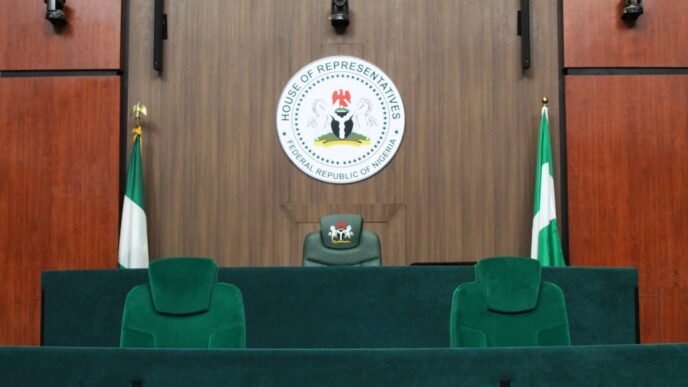HB: 2121 A BILL FOR AN ACT TO ALTER THE CONSTITUTION OF THE FEDERAL REPUBLIC OF NIGERIA, CAP. C23, LAWS OF THE FEDERATION OF NIGERIA, 2004 TO REVIEW THE FRAMEWORK FOR LOCAL GOVERNMENT ADMINISTRATION, ESTABLISH A ROBUST LEGAL REGIME TO STRENGTHEN ADMINISTRATIVE EFFICIENCY, PROMOTE TRANSPARENCY, ACCOUNTABILITY, AND DEEPEN DEMOCRATIC PRACTICES AT THE LOCAL GOVERNMENT LEVEL; AND FOR RELATED MATTERS Bill Sponsor: Hon. Benjamin Okezie Kalu Bill Progress: Committee Stage
This Bill seeks to alter the provisions of the Constitution of the Federal Republic of Nigeria, 1999 to establish Local Government as a tier of government and guarantee their democratic existence, with a four year tenure. The Bill also proposes to abolish the State Joint Local Government Accounts. Instead, it proposes creating a special account where all funds allocated to Local Government Councils directly from both the Federation Account and the State Government will be deposited.
The recent introduction of House Bill 2121 by the Nigerian House of Representatives has sparked significant interest across the nation, drawing attention to a critical aspect of governance: local government administration. This proposed legislation aims to amend the Constitution of the Federal Republic of Nigeria, explicitly targeting the framework that governs local governments. The intentions behind HB 2121 are rooted in an urgent desire to enhance administrative efficiency, transparency, accountability, and democratic practices at the grassroots level.
At its core, the bill seeks to address long-standing challenges faced by local governments in Nigeria. Historically, these entities have struggled with autonomy and effectiveness due to their oversight by state governments, which often limits their functions and hinders service delivery. Such constraints have not only stifled local governance but have also led to a disconnect between local officials and the communities they serve. By proposing an alteration to the constitutional framework, HB 2121 aims to empower local governments and ensure they can operate independently, thereby enhancing their capacity to deliver essential services to citizens.
One of the primary objectives of the bill is to establish a more robust legal regime that would fortify the administrative structures of local governments. A well-defined legal framework can provide clarity on the roles and responsibilities of local officials, streamline operations, and promote effective management practices. This can consequently lead to improved service delivery, as local governments will have a clearer mandate and the necessary tools to execute their duties efficiently.
Moreover, transparency is a key pillar of HB 2121. The proposed legislation aims to create mechanisms that will hold local government operations and finances open to public scrutiny. By ensuring that residents have access to information regarding how local funds are being utilized, the bill could foster a culture of accountability. This aspect is particularly important, as local governments have often been susceptible to corruption and mismanagement. When citizens are empowered with knowledge about financial matters, they can demand greater accountability from their elected representatives, promoting a governance structure that is responsive to the needs of the community.
In addition to transparency and accountability, the bill emphasizes the need to deepen democratic practices at the local level. Strengthening democratic principles is crucial to fostering citizen participation, increasing engagement in the electoral process, and ensuring that local elections are fair and credible. Enhanced democratic practices can lead to more representative governance, reflecting the diverse needs and aspirations of local populations. This shift could significantly improve the relationship between local government officials and the communities they serve, as citizens become more involved in decision-making processes impacting their daily lives.
The implications of passing HB 2121 would be far-reaching. If enacted, the bill has the potential to alter the landscape of local governance in Nigeria, impacting how local governments are funded, the powers bestowed upon them, and their relationships with state governments. The creation of an independent and effective local government structure could empower communities, allowing them to take ownership of their development. This level of empowerment is essential for fostering civic engagement and ensuring that local needs are prioritized in governance.
Furthermore, the proposed reforms could act as a catalyst for broader reforms within Nigeria’s political landscape. Strengthening local governance can encourage transparency and democratic principles throughout the entire federal system. This grassroots transformation can lead to improvements in state and national governance, as empowered local governments work toward national goals and align with federal policies more effectively.
However, the journey toward passing HB 2121 is not without its challenges. The process of amending constitutional provisions is notoriously complex, requiring a supermajority vote in both the Senate and the House of Representatives, along with subsequent approval from a majority of state Houses of Assembly. This procedural requirement underscores the need for widespread political will and engagement from all stakeholders involved.
Opposition parties and other interest groups may raise concerns regarding the potential implications of this bill, particularly around issues of regional power dynamics and the distribution of resources. Critics might argue that empowering local governments could shift the balance of power in ways that are not favorable to certain regions. As the discourse around the bill unfolds, it is crucial for politicians and advocacy groups to engage in dialogue that addresses these concerns while advocating for the positive changes HB 2121 aims to bring.
In conclusion, House Bill 2121 represents a pivotal moment in the evolution of local government administration in Nigeria. The proposed changes have the potential to reframe governance at the grassroots level, promoting transparency, accountability, and democratic practices. As the bill progresses through the legislative process, it will be essential for all stakeholders to advocate for its passage while addressing the challenges that arise along the way. A successful implementation of HB 2121 could signal a significant shift toward more empowered and effective local governance, ultimately leading to better service delivery, increased civic engagement, and a stronger democracy in Nigeria. The coming months will be critical as citizens, lawmakers, and civil society groups actively participate in this ongoing dialogue about the future of local governance in the country.













